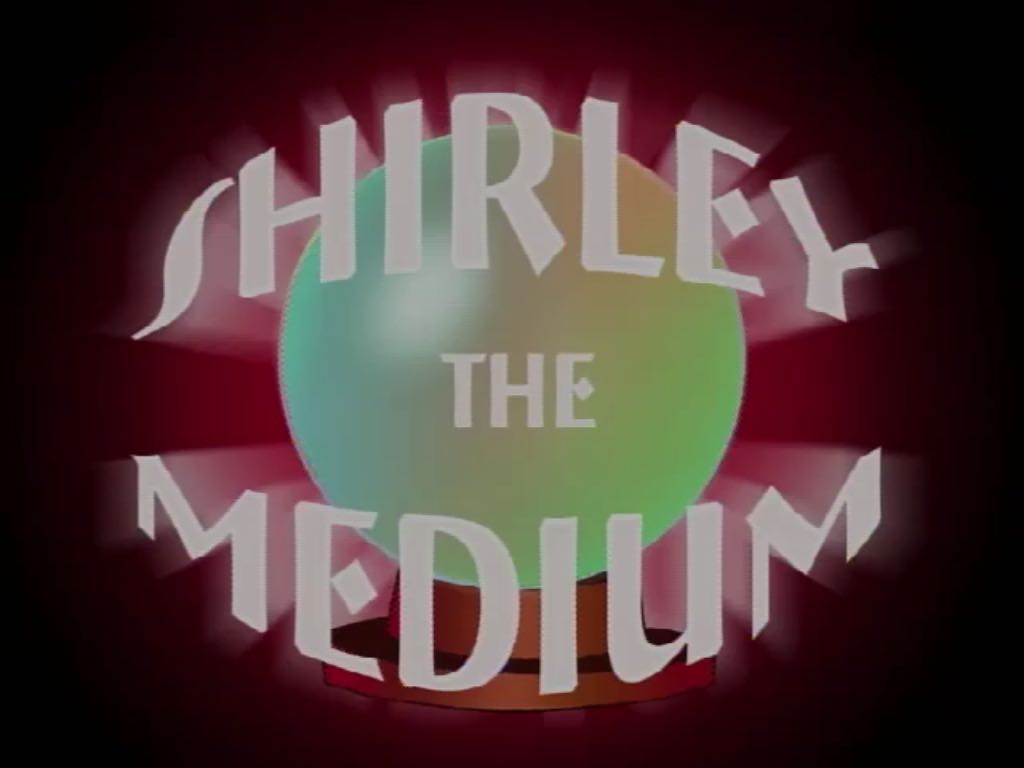“Shirley The Medium” is an original recomposition of elements from diverse sources:
- Pandora’s Box, the Ancient Greek Myth
- A Christmas Carol, Dickens
- Modern TV psychics

STORY STRUCTURE OF SHIRLEY THE MEDIUM
SHORTCOMING
Courage is unable to tell Eustace not to open the box. He is a dog and can’t speak English. Besides that, the adults don’t listen to him anyway.
Also, in this episode, one shortcoming is that Courage needs to please his owners, even though one of them is outright horrible. When he digs up a locked box he hands it over to Eustace after overhearing Eustace complaining about his dead brother’s box of money. This leads to no end of trouble.
DESIRE
Courage wants to prevent Eustace from opening a box.
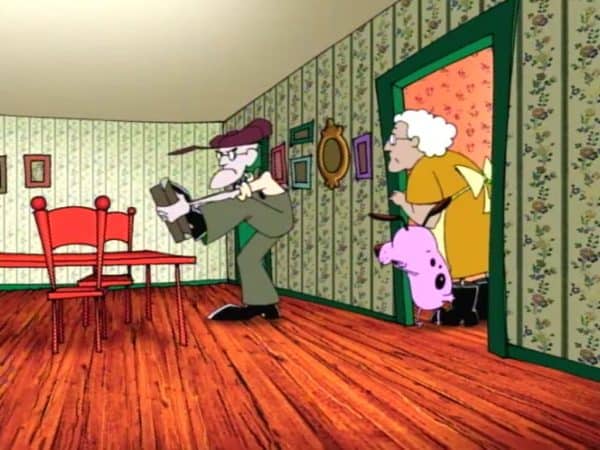
There is a different desire, however, to set off the action. Courage wants to find his yo-yo. He runs out into the yard and searches through his hole, which is the child-dog equivalent of a child’s toy box.
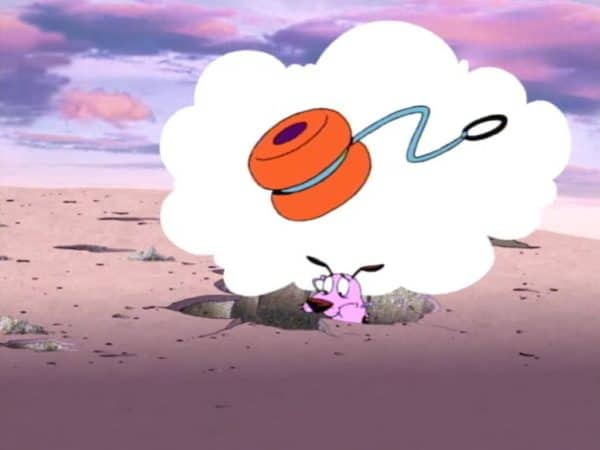
The yo-yo could easily be treated as a McGuffin — something used to start the story off and then forgotten. But the yo-yo subplot is revived later for comic effect when Shirley the Medium exclaims, “I see… I see… A yo-yo! Under the couch!”
OPPONENT
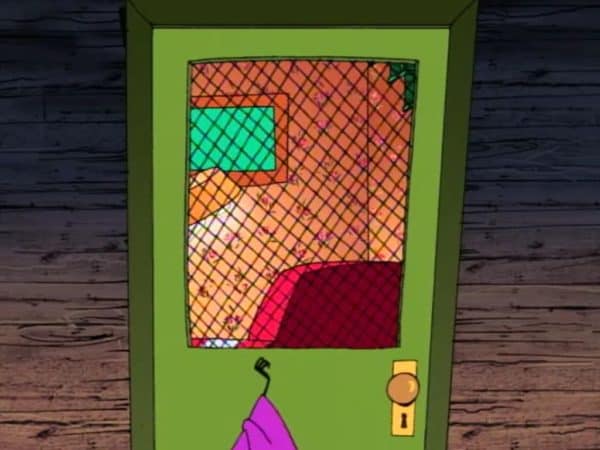
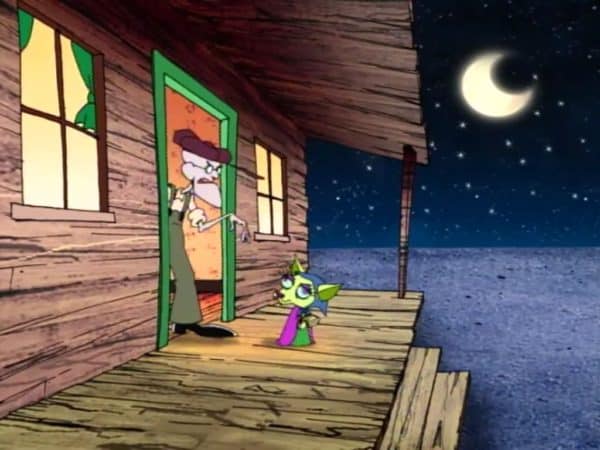
There is plenty of opportunity for conflict in this episode.
- The dead brother, comically named ‘Horse’. Muriel tells us that there was always a long-running feud between Eustace and Horse. Eustace’s reaction to Horse on his birthday is comically over-the-top: “We have settled our differences. He’s dead and I’m not!” In the Pandora mythology, Prometheus (“Foresight”) and his brother Epimetheus (“Hindsight”) likewise have a problematic relationship.
- Shirley the Medium, who Eustace dislikes — because Eustace automatically dislikes everyone. In this case he doesn’t like handing over money for a service he feels hasn’t been provided. Courage, too, knows that nothing good will come of Shirley’s helping to open the box.
- Between Eustace and Muriel — Muriel is conciliatory whereas Eustace alienates.
- Between Courage and Eustace/Muriel, who won’t listen to him.
- The Minotaur opponent: The ghouls inside the box. (This is also the least interesting opponent.)
Cleverly, the audience is not shown the ghouls. Instead we see Courage watching the ghouls.
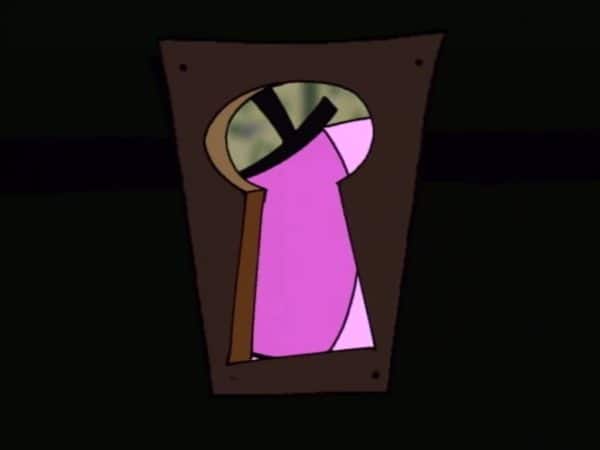
We’re offered a taste of ghoulishness when we see Courage transmogrify.
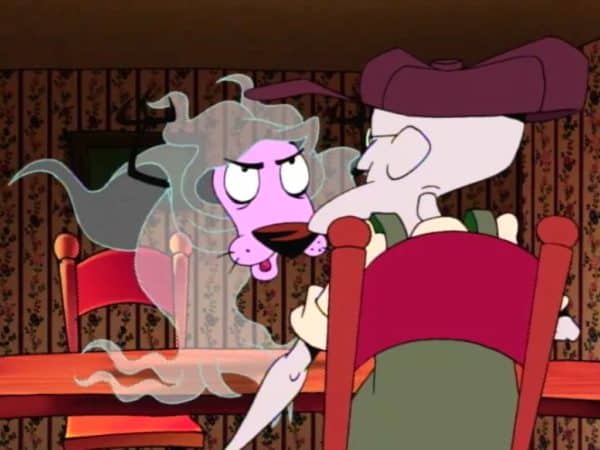
PLAN
Courage always has the same plan.
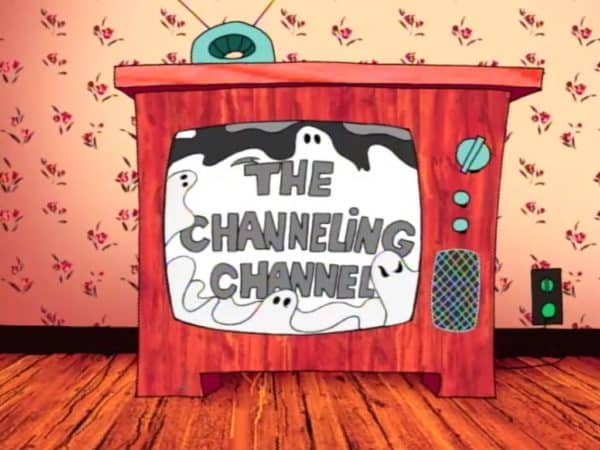
This story is similar to the mattress episode in that the plan comes from Muriel and Eustace initially. Muriel wants Eustace to wish Horse a happy birthday while Eustace wants to connect with his brother in order to find out what he did with the key to his box of money, which Courage has found while looking for his yo-yo, and naively handed over. The interesting comic technique here is piling coincidence upon coincidence. All of these things are happening at once:
- It’s Horse’s birthday
- Courage just happens to find a box of money while looking for his yo-yo
- Eustace just happens to mention the box of money
- An advertisement for a psychic medium comes on the telly just as they’re discussing Horse and his unwillingness to spill the beans on the money.
We can make the most of these coincidences when writing comedy. That many coincidences piled up are themselves comic.
Courage has already looked into the box and knows there’s nothing good inside. He tries to alert the people who can help. Eustace throws him aside (literally). Muriel is of a much kinder nature and unwittingly shuts him up by shoving a taste-test of jam into his mouth.
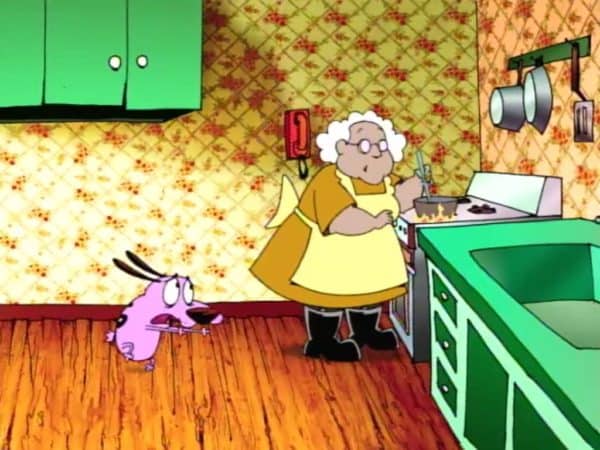
He tries to stop the medium coming into the house, to no avail.
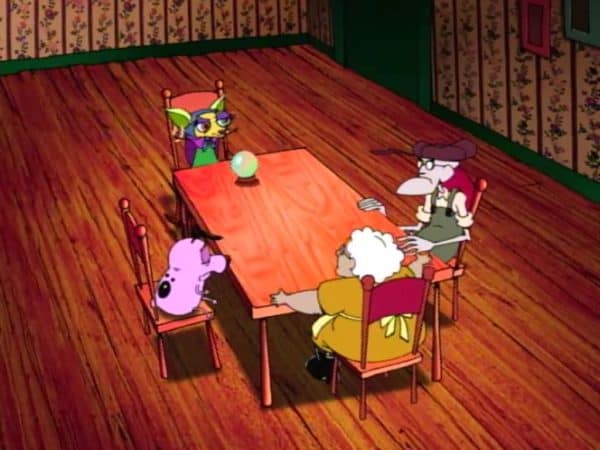
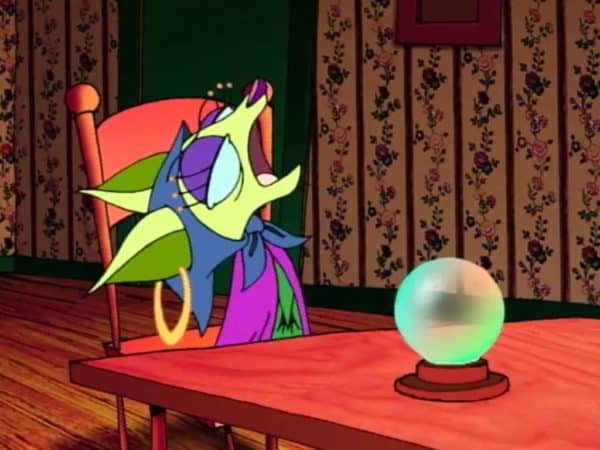
With Muriel and Eustace’s plan winning out, we are treated to a highly comedic sequence in which Muriel talks to Gertrude, Horse’s dead wife, and the first thing they talk about is how much vinegar to use when making jam. This starts off the jam-making subplot which will keep Muriel occupied in the kitchen while Eustace is hell bent on opening the box. There is also a dial tone ringing. The seance is treated like a realworld telephone call. Eustace, exclaims, “He never answers my calls!”
The phone theme is continued when, unable to speak to Eustace using human language, it turns out he is able to (perhaps) be understood if he is calling on a phone. This implies that the only reason Eustace cannot understand Courage is because he knows from his form that he is a dog, and if only he were to listen closely enough he’d understand perfectly. The great thing about the setting is that it is completely desolate, so when the writers plonk a phone booth out there the juxtaposition provides humour.
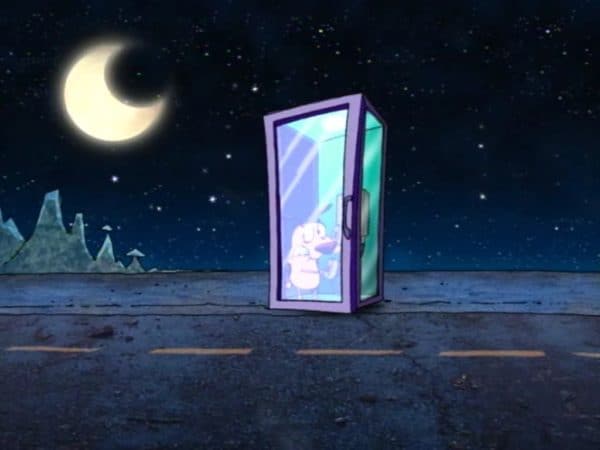
Eustace does find out however that his brother has sewn the key to the box inside the lining of Eustace’s hat.
After the big struggle scene, Courage must change his plan. He goes to find Shirley the Medium so she can put the situation right. He carries her back to the house for a second time where she, and only, she has the power to (simply) shut the box.
Although it is Shirley who puts the finishing touches on saving the day, the main saviour is Courage, who not only retrieves Shirley, but has the idea of tying the house up with rope so that at least the ghouls are contained. He gets the rope from the washing line.
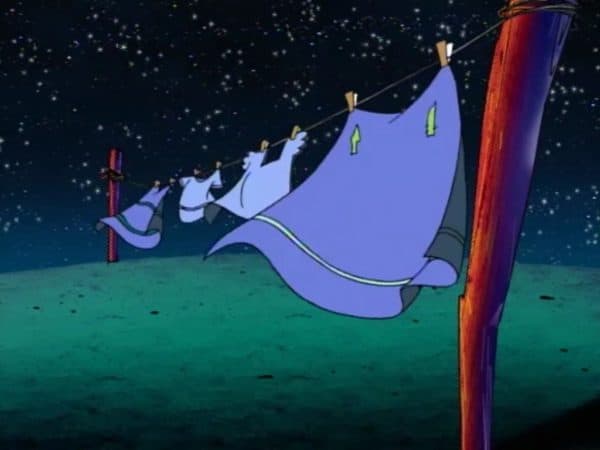
Hilariously, on the cusp of imminent death, Muriel asks if he’s folded up the washing first. (He has. “What a good dog!”)
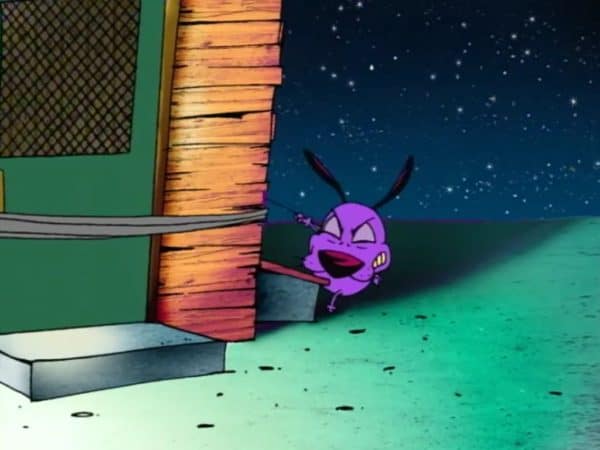
The ‘thread thread’ is continued across scenes — when Courage reaches Shirley at her TV studio she happens to be flossing her teeth. This is a clever transition.
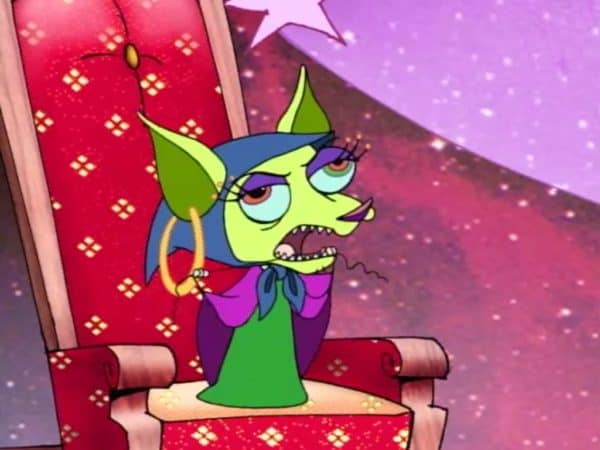
BIG STRUGGLE
This episode has a moral: Greed will lead you to trouble. There’s nothing subtle about it. We’ve already seen in a previous episode another deadly sin utilised — both Eustace and his mother are vain (about their lack of hair). Greed is associated with the colour green — possibly more so in America, where money is literally green — so it’s fitting that the whole room light up green when Eustace opens the box.
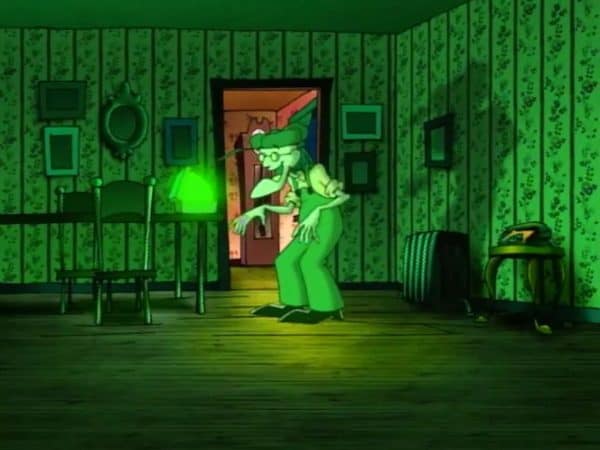
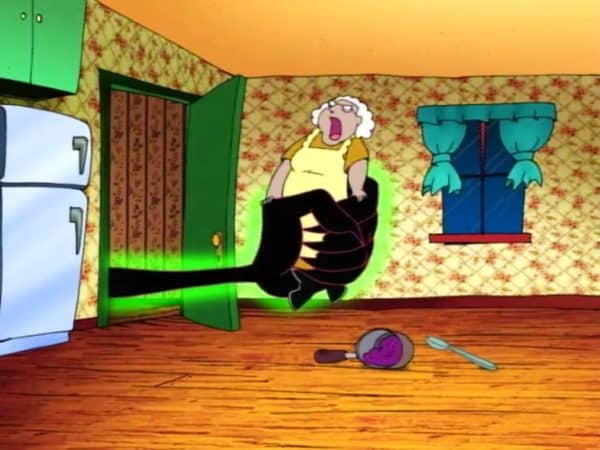
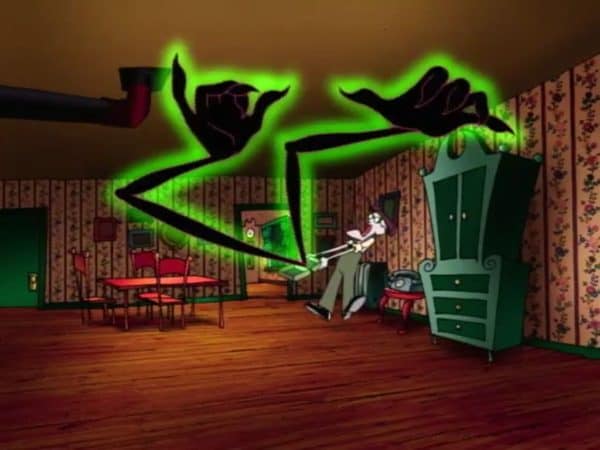
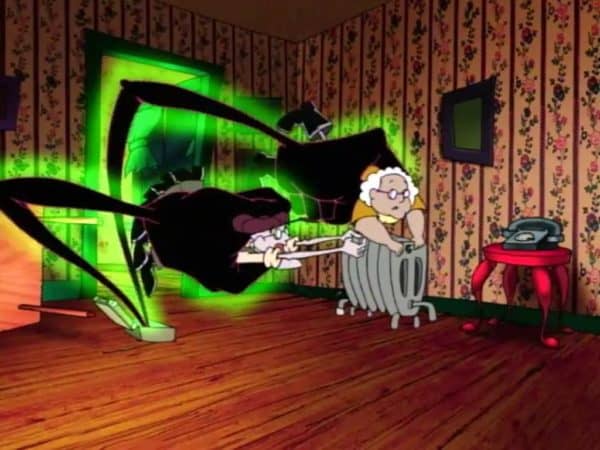
ANAGNORISIS
Eustace finds himself shut inside the box and is delighted to see piles and piles of money.
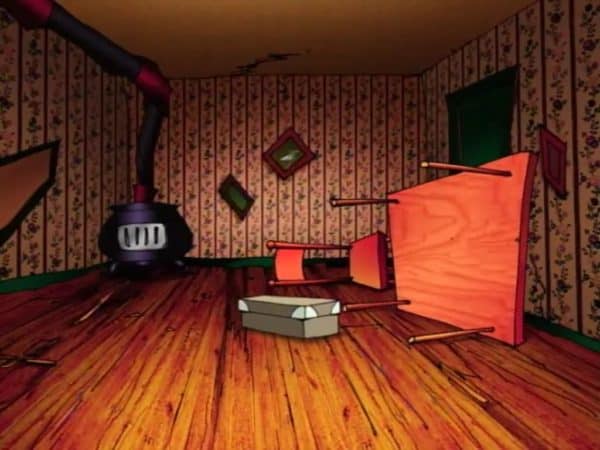
“But… what can I spend it on?” he asks didactically. The message is obvious. This is a message that’s been done seriously many times before, perhaps most famously in A Christmas Carol by Charles Dickens. This cartoon doesn’t really exist to teach a message. Instead, the anagnorisis part of the story is a requirement of a complete narrative, and it must exist here no matter how ‘on-the-nose’ it is. In fact, its on-the-nose quality add to the humour. It’s funny that Eustace hasn’t already learned this simple life lesson.
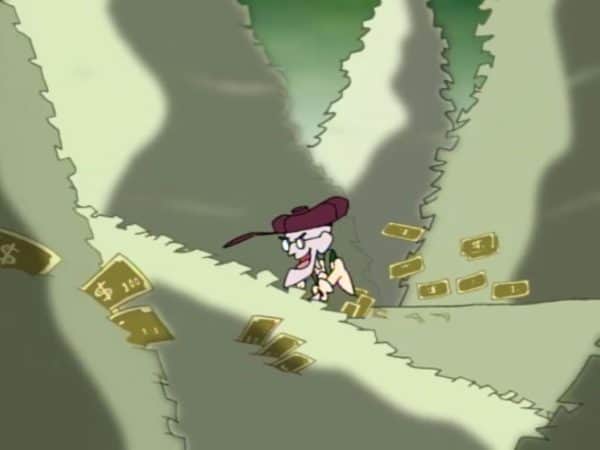
NEW SITUATION

The jam subplot is concluded with Muriel sitting on the rocking chair eating it out of the pot. Eustace calls out from the box, “Hey, can I buy some jam?” Muriel says he can eat jam just as soon as they find the key for the box.
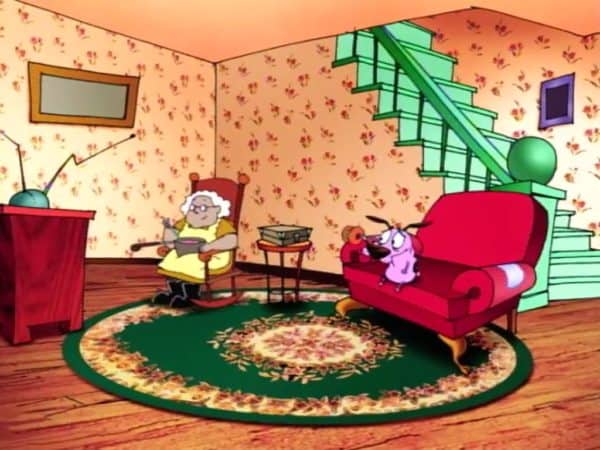
The best of the Courage episodes have excellent closing scenes in which Courage turns to the audience and delivers a joke just for them. Here he reveals to us that he is hiding the key in his mouth. Young viewers love to feel included in this way, and feel fully on side with Courage.

